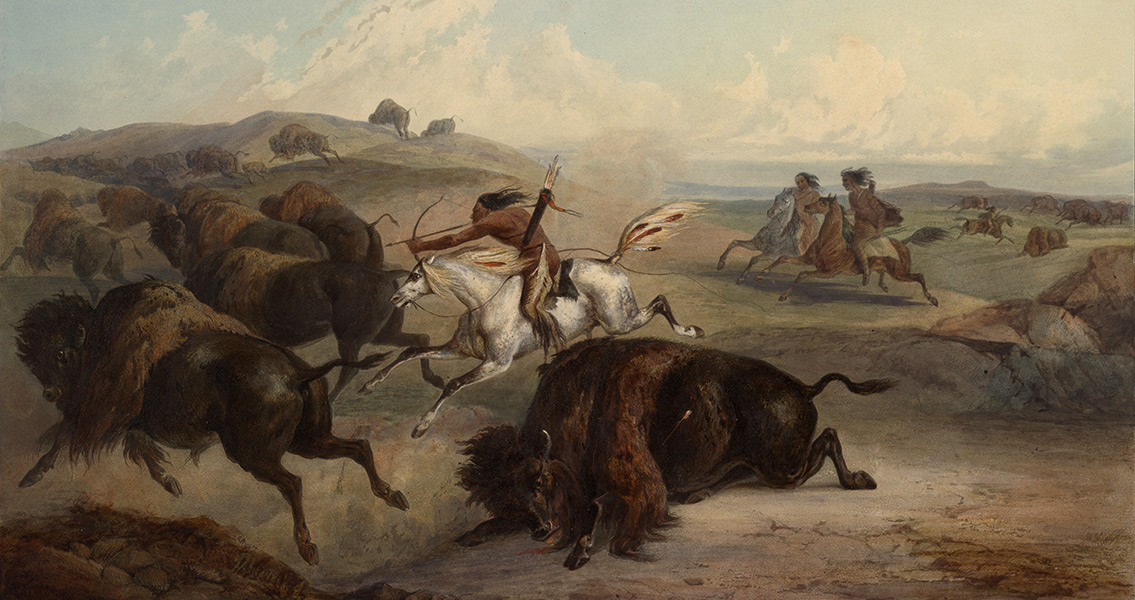<![CDATA[The Illinois have been described as the most war-like Native American group. At the time of European contact in the seventeenth century, the Illinois were thought to number over 10,000 people. The occupied area stretched from present-day Iowa to the shores of Lake Michigan, reaching as far south as Arkansas. New research has traced the fascinating history of this formidable people. Robert Morrissey, assistant professor of history at the University of Illinois, has studied the Illinois' relationship with bison and how these powerful beasts shaped their history. During the early 1600s, climate change forced a group of Algonquians westward from the Great Lakes into an entirely different landscape: the tallgrass prairies of the American Midwest. These people had to adapt their lifestyle drastically in order to survive in the new grassland environment. Adopting a new existence based on pedestrian bison hunting, these groups forged a new identity as the Illinois. This new bison-based economy fostered important changes in Illinois social life; a new division of labour developed and new conflicts arose with neighbours. Morrissey's research, published in the most recent edition of Early American Studies, reveals how the Illinois’ adaptation to the distinctive prairie environment influenced their history. “Although most historians have ignored the bison as a factor in the history of the Illinois and their region, the animals were a central fact of life there,” Morrissey explained. The traditional food eaten by Algonquians near the Great Lakes was beaver. On the Plains of the Midwest, however, beaver were scarce and of low nutritional quality. Bison, on the other hand, were plentiful. Bison hunting gave the Illinois new opportunities and shaped Illinois society in fundamental ways. “A unique economy, pedestrian (i.e., non-equestrian) bison hunting required two things: a large population and much labor,” Morrissey writes. “Because bison could be effectively hunted and processed only in large groups, committing to the bison required (but also enabled) larger villages.” Also, the processing stage was vitally important in the bison economy. As a result, the Illinois needed specialist workers to preserve the meat, render the tallow and tan the hides, Morrissey explains. “The Illinois conducted their bison economy with a gendered division of labor in which women performed the difficult tasks of hide and meat processing, this meant that the Illinois needed women.” The bison economy’s reliance on women for curing meat and creating hides fueled slave raids by the Illinois. In search of new female workers, the Illinois raided their nearby neighbours and enemies, creating a condition of continual war. Morrissey explained that “the Illinois were creating a cycle: more bison exploitation encouraged more raiding, and more violence, and larger settlements and . . . more bison.” When Native Americans came into contact with European explorers, the Illinois fought particularly intense wars. Morrissey argues that the effects of European colonisation on the Illinois cannot be understood independently of their bison economy, such was their dependence on these animals. European diseases began to hit Illinois villages in the 1670s and 1680s when European missionaries and fur traders, especially those specialising in bison hide trading, brought microbes and viruses. Diseases began to affect the Illinois significantly in the early contact period. These diseases put extra strain on the Illinois bison economy. Disease amongst the Illinois led to a shortage in specialist workers. This, in turn, led to increased slave raids and war, stretching the Illinois population to breaking point. “What seems clear is that the bison economy and the colonial changes combined to produce devastation for the Illinois in ways that were unique and particularly intense,” Morrissey argues. For more information: www.muse.jhu.edu Image courtesy of Wikimedia Commons user: Jan Arkesteijn]]>
Bison-Hunting Shaped Native American Society
